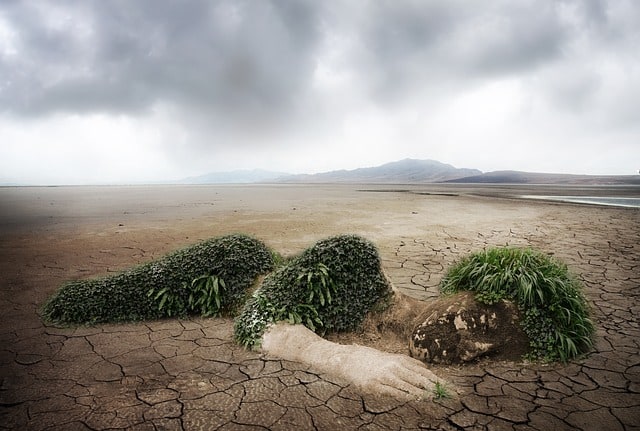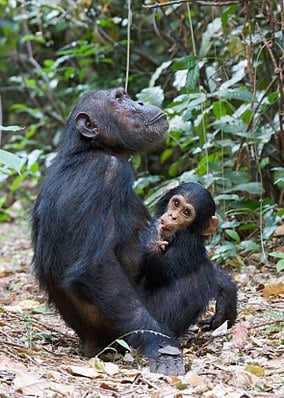It’s fashionable these days to blur the line between animal and human consciousness. As a reader wrote with regard to my claim that animals don’t have psychological memory, “There is really no sharp demarcation between animal mind and human mind.”
The truth is that the human mind is qualitatively different than the mind of any other animal on this planet. The human mind is what has made this primate to become a planet killer. Therefore it falls to us to be clear about what the difference between humans and other animals is, in order to bring about some degree of harmony between the human species and the earth.
On one side are the obscurers who say humans are murderous and genocidal because nature made us so. In his book “The Lucifer Principle,” Howard Bloom manages to be misogynistic and nature hating at the same time, as epitomized by a  chapter entitled, “Mother Nature, The Bloody Bitch.” Bloom pronounces, “Our biological legacy weaves evil into the substrate of even the most ‘unspoiled’ society.” That’s hideously false.
chapter entitled, “Mother Nature, The Bloody Bitch.” Bloom pronounces, “Our biological legacy weaves evil into the substrate of even the most ‘unspoiled’ society.” That’s hideously false.
On the other side, are the obscurers who romanticize nature and blame civilization, maintaining that humans are only destructive because the Agricultural and/or Industrialization Revolutions made us so.
Nature is neither inherently benevolent nor inherently bloodthirsty. “Tooth and claw” is fitting in nature, but an abomination in man. The fight for survival is universal and ubiquitous to be sure, but ‘higher thought’ is what turns killing to survive into murder and war.
Anthropomorphizing nature can become hilarious, as when Bloom says “You can see the smiles on lions’ faces as they lick their paws and stretch out on the ground side by side, clearly pleased with the comfort of each other’s warmth…But these peaceful creatures will tear a gazelle limb from limb.”
Jane Goodall once observed a large band of chimps split into two groups. They lived at peace in adjacent territories for some time, but then some of the males from the core group began to make clearly planned forays into the splinter group’s new territory, mercilessly attacking former friends and eventually destroying the new band. Here we see the genesis of genocide and the beginnings of nationalism and xenophobia.
Primatologist Roger Fouts says that the chimpanzee is a “highly intelligent, co-operative and violent primate who nurtures family bonds, adopts orphans, mourns the death of mothers, practices self-medication, struggles for power, and wages war.” That’s overstated, and also blurs the distinction between chimps in their ecological niche, and humans outside of ecological niches.
So do cruelty, murder, war and genocide occur in nature? Only when higher thought begins to emerge. Jane Goodall says, “When I first started at Gombe Reserve in Tanzania, I thought the chimps were nicer than we are, but now time has revealed that they are not. They can be just as awful.” What makes them awful? Chimps have a rudimentary capability for calculated cruelty. In them we see the beginnings, not the full-blown pattern of murder, war and genocide.
“When I first started at Gombe Reserve in Tanzania, I thought the chimps were nicer than we are, but now time has revealed that they are not. They can be just as awful.” What makes them awful? Chimps have a rudimentary capability for calculated cruelty. In them we see the beginnings, not the full-blown pattern of murder, war and genocide.
The predator-prey relationship is as old as life itself. Violence, conflict and killing are common in the natural world, but they are part of natural selection. Murder and war are another matter. Does one colony of ants make war when it fights another colony of ants? No, that is poetic license, since war is consciously planned aggression against one’s own kind.
With the possible exception of our close cousins the chimpanzees, a primate as genetically similar to us as horses are to zebras (so similar in fact that we could give each other blood transfusions), the human mind is qualitatively different than any other animal’s mind in nature. To be sure, nature has produced the aberration that is ‘man,’ which, through conscious, symbolic thought, has broken the bonds of ecological niche.
We inherited our dilemma from the bestial ballet of nature, but only we can resolve it. As we can see with its rudimentary beginnings in chimps, symbolic thought is what makes the human animal so powerful, combining a calculating, ‘us vs. them’ mind with territorial and aggressive instincts. That’s why, without self-knowing and insight, humans are inevitably destructive, and doomed.
Can we make the transition from consciously separative cunning to awakened cosmic intelligence? Our survival and flowering as a species depends on it. The urgent question is: can we make the transition in this age?
Martin LeFevre

